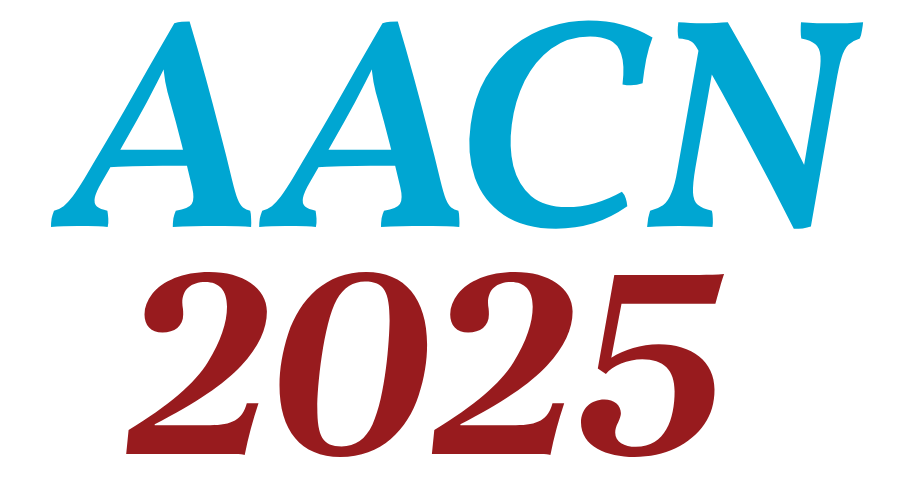Poster Abstract Submission Deadline:
January 24, 2025 at 11:59 PM PST
Thank you for your interest in submitting an abstract for a poster presentation at the 2025 AACN Conference! Please use this form to provide all of the needed data. After clicking on the Submit button, you will receive an automatic email confirmation that your submission was received.
Abstract Instructions
Please read and heed all instructions before submitting an abstract. You will note the 200-word limit for your abstract. In addition to this limitation, please note the following instructions regarding your submissions:
- Only indicate the abstract as a student abstract if the student (or fellow) is a FIRST author.
- Submissions must include actual data, not data you plan to collect. Case studies may be submitted, but only when there is a clear contribution to knowledge base in the field from the standpoint of a rare condition or atypical case.
- The corresponding author listed receives all communication around the abstract including whether the abstract was or was not accepted to the conference and details about the poster session.
- The corresponding author must register for the 2025 AACN conference.
- Please refer to the below posted example abstract regarding style issues including the use of capitalization and acronyms in the title. Acronyms are acceptable in the text of the abstract. Some acronyms of more universally recognized assessment measures, procedures or disorders are okay to use in the title. The following list of measures, disorders, and procedures are the only ones that should be presented as acronyms in the title:all versions of WAIS, WMS, CVLT, MMPI, and HIV, TBI, PTSD, MRI, CT. In the text they should still be spelled out fully for first use. It is acceptable to spell these out if you prefer, but please DO NOT assume acronyms with which you are familiar are universally understood. All others should be spelled out both in the title and the first time they are used in the text.
- Please refrain from using section headers in the abstract (e.g., Methods, Results, etc.).
- Do not include credentials in the listing of authors or list author names in the body of the abstract.
- Please do not submit the same abstract twice – if you are unsure as to whether your submission went through, please wait it out then contact us directly if you do not receive a submission verification email after 1-2 hours. Also, please check your bulk/junk/spam mail folder for the verification email.
- Please carefully proofread your abstract before submitting. We are unable to make manual changes to abstract wording, order of authors, or other aspects after submission. All submissions are final.
- Trainees are strongly encouraged to solicit proofreading from mentor or faculty to address brevity, clarity, and style consistency. Doing so will improve likelihood of acceptance and prevent the need for editorial changes to your abstract.
- Submissions are final. We are unable to make changes to abstract content, authors, or corresponding author after submission. Please contact us if you have difficulties submitting.
- Please direct any questions about the abstract submission / review process to Sara Lippa, PhD, ABPP at saralippa@gmail.com.
Example Abstract
The Utility of the Test of Memory Malingering in Patients with Dementia
The Test of Memory Malingering (TOMM) is one of the most well studied and frequently used symptom validity tests. However, few investigations have been conducted concerning its applicability in a dementia population. From these studies, conflicting data has emerged and its utility is unclear. The purpose of the present evaluation was to elucidate the role of the TOMM in evaluations of patients with dementia. The files of 21 patients diagnosed with dementia using the DSM-5 criteria referred for neuropsychological evaluation were examined. Neurocognitive data included the Test of Premorbid Functioning (TOPF), the Repeatable Battery for the Assessment of Neuropsychological Status (RBANS) and the TOMM. The combined sample IQ was within the average range (TOPF predicted mean FSIQ=104.24, SD=13.67). The sample demonstrated overall mild impairment as assessed by the RBANS Total Index Score (mean=78.29, SD=17.920). TOMM performance was as follows: Trial 1 (mean=43.90, SD=7.20), Trial 2 (mean=47.57, SD=5.52), and Retention Trial (mean=31.50, SD=12.02). All trials of the TOMM correlated significantly with the RBANS Total Index (T1 r=0.72, T2 r=0.68, Retention r=1.00). Overall, results suggest that in individuals with more advanced dementia, the TOMM is likely not an appropriate measure of effort using the traditional cutoff of 45.

